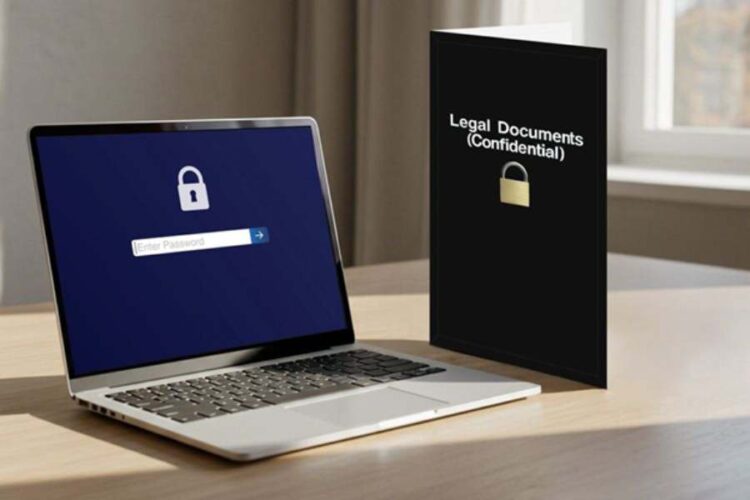As legal professionals, we hold more client information than most businesses, making it an enticing target for criminals.
Beyond providing legal counsel, protecting client data is paramount. Under ABA regulations and laws like HIPAA, firms must maintain rigorous security—failures can lead to severe fines and imprisonment.
While fines and incarceration are potentially salvageable, the cost to your attorney-client relationship is not. Legal action against you or your firm affects more than just current clients but your ability to secure new ones.
So, it’s essential to have an airtight security system in place: your ability to practice law may hang in the balance.
Luckily, with proper precautions, these risks are manageable.
Best Practices for Securing Legal Documents
Prioritize Encryption on All Devices
Encryption is like locking the office at night—without it, your data is wide open. According to the ABA’s 2023 Legal Technology Survey Report, 29% of firms have experienced a security breach—a number that’s only increased in the past years.
When you store client data on laptops, desktops, or mobile devices, adopt these robust encryption protocols.
- Use Dedicated Tools—email encryption software and secure messaging apps ensure that sensitive messages aren’t intercepted in transit.
- Secure Remote Access—If you work remotely, learn about using a VPN (Virtual Private Network). This encrypts the connection between your device and the firm’s network, shielding it from prying eyes on public Wi-Fi.
- Adopt Multi-Factor Authentication (MFA)—This adds an extra barrier beyond just passwords, requiring a token or code. A firm using Microsoft 365 or Google Workspace can enable MFA so that, after entering a password, an attorney must also approve a login request through a smartphone app or enter a time-limited verification code.
Choose Secure Cloud Storage Solutions
Proskauer Rose, a New York-based law firm, recently reported an incident where sensitive client data was breached on the company vendor’s cloud server. The server stored over 180,000 files, which were viewable from the web by anyone who knew where to look.
This cautionary tale underscores why law firms must be discerning when choosing a cloud provider. If you’re not using a high-quality provider designed with legal security in mind, your data is vulnerable to hackers.
Look for a cloud service that encrypts files both at rest (when they’re saved) and in transit (while you’re uploading or downloading). Ensure each user’s access level is defined precisely—no paralegal should see more files than necessary.
Lock Down Your Physical Premises
While digital threats get a lot of attention these days, old-fashioned physical breaches still occur when offices get lax about who can access paper files and storage areas.
One helpful technique is imagining your building as a system of barriers to overcome.
- First barrier: Require all non-staff individuals to sign in. This creates a record of who enters the back-office areas and deters casual intruders.
- Second barrier: Invest in sturdy, lockable file cabinets for sensitive documents. Then, assign the keys to only key members of your staff.
- Third barrier: Rely on professional courier services that specialize in handling legal documents. Handing off records to an unverified third party can invite unnecessary risk.
Mind Your Document Folders
Document folders are commonplace in the legal profession, but they could be a potential weak point. A folder simply bought off Amazon risks being the wrong fit for your specifically sized documents, and the last thing you want is an important file falling out of a spacious pocket during travel.
Legal-size folders are designed to protect legal-sized documents, coming in a variety of shapes and sizes. While fine as is, there are a few things you can do to secure these folders even further.
- Use a Velcro Closure—It has likely happened before: you bump into someone, and your folder contents spill out. Velcro closures help keep your legal documents securely contained, preventing accidental exposure. They also make an audible “rip” sound when opened—so even if facing the other way, you know the moment someone is accessing your documents.
- Secure Documents with Fastener Prongs—-Similar to what Velcro closures do for outside of a folder, fastener prongs secure your filings, report covers, and other documents on the inside.
Proper Document Disposal and Retention
Even the most secure data storage methods can be foiled if old documents are handled carelessly. The risks of a data breach only multiply when files are tossed in the trash or left unprotected in a file room. Either store your documents securely or delete them without a trace. To do this:
- Shred Documentation—All paper files past their retention period should be professionally shredded. Request and file a certificate of destruction from your shredding provider. This not only creates an audit trail but can also prove compliance in case of disputes or regulatory inquiries.
- Secure Digital Deletion—Electronically wiping or securely erasing data prevents it from being recovered on decommissioned devices or servers.
- Comply with Laws and Regulations—Every jurisdiction has its data retention and disposal requirements. Stay up-to-date on these rules to avoid hefty fines or legal consequences, especially during litigation, where improper disposal of documents can affect the outcome of a lawsuit. If interested in outsourcing your document disposal, consider hiring a NAID AAA-certified disposal company.
Secure Your Documents and Avoid Future Liability
Protecting your clients’ data is neither a one-time task nor just another administrative chore. It’s a mindset that should be woven into every aspect of your operations. When you cultivate a culture of security, you shield both your clients and your business—ensuring that the trust you’ve worked so hard to build remains unshakeable.
References
1. 2023 Cybersecurity TechReport – American Bar Association
2. Legal Size Presentation Folders | Company Folders, Inc.










